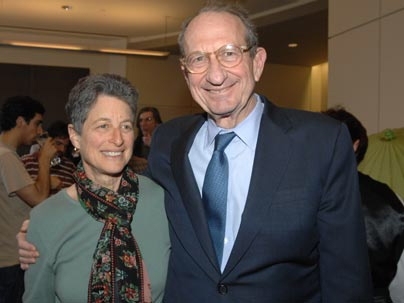Even before he had completed his PhD work at MIT in the early 1960s, Institute Professor John Deutch was already getting calls from Washington asking him to step away from academia and enter government service, says his former thesis advisor Irwin Oppenheim, professor emeritus in the chemistry department.
"While he was writing his thesis, I remember spending most of my time fighting with the Pentagon, they kept saying they needed him," Oppenheim said Thursday, after a symposium in celebration of Deutch's 70th birthday that featured several high-profile speakers from government service, academia and industry.
Deutch had attracted the attention of national leaders by doing a study that questioned - "quite correctly," Oppenheim said - the value of the Skybolt missile system then under development, which was cancelled as a result.
Deutch did eventually get called to Washington service, both in the 1970s and the 1990s, serving four presidents in a variety of posts in the departments of defense and energy and as director of central intelligence - but only after he had already achieved tenure on the MIT faculty.
In addition to his government service and his teaching and research duties, which included 140 published papers in chemistry, Deutch has held important administrative posts at MIT. He served as head of the Department of Chemistry, dean of science, and provost under former President Paul Gray. In 1993, he was selected as an Institute Professor, the highest honor available to professors here.
Speaking at the celebration were longtime friends and colleagues including professor George Whitesides of Harvard, former Secretary of Defense and Secretary of Energy James R. Schlesinger, former Secretary of Defense Harold Brown, former National Security Advisor Brent Scowcroft, former Assistant Secretary of Defense Richard Perle and former White House Chief of Staff John Podesta, former congressman Phil Sharp, Washington-based lawyer Linda Stutz, and Deutch's son Philip (who described himself as "Deutch 2.0" and whose talk featured a picture of his own two children, or "Deutch 3.0").
Whitesides, a longtime friend and colleague of Deutch, described him as "a person of gravitas" who has significantly helped to shape the course of academic science in this country, from "just working on puzzles, to working on important problems" that affect society.
In addition to several talks, the symposium featured two panel discussions on subjects related to Deutch's government positions: energy and national security.
Deutch himself, commenting at the end of the symposium, referred back to comments Schlesinger made during the energy discussion, talking about the limitations of solar and wind power. "The wind does not blow all the time, and the sun does not shine all the time," Deutch said. "But the wind always blows and the sun always shines on me here at MIT."
A version of this article appeared in MIT Tech Talk on April 29, 2009 (download PDF).






